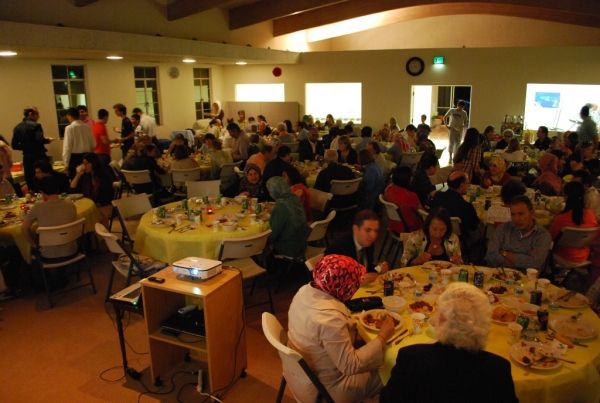The Interfaith Iftar Dinner at San Fernando Valley Branch (August 4th, 2012)
The Interfaith Iftar Dinner at San Fernando Valley Branch (August 4th, 2012)
Pacifica Institute organized an Interfaith Iftar dinner at San Fernando Valley branch. Pacifica Institute volunteers welcomed faculty members, religious leaders, and people from all walks of life including San Fernando Valley’s community leaders. The dinner hall was filled to capacity with around 150 guests attending. Pacifica organizes these Iftaar dinners every year. And this year just like every year we brought together members of different faiths and their experiences with fasting in their own religious traditions.
Fasting has numerous social and health benefits as t hose gathered at our iftar in the Valley learned. The fasting experiences of a Muslim, a Christian father and a Jewish activist were shared with those gathered at the dinner.
Adjunct Professor in Claremont Graduate University Ozgur Koca was the presenter of the theme “Ramadan experience” . He gave the context of fasting in Islam which revolved around the belief that there was “one God but many prophets”. Muslims revere prophets of these different traditions including Moses and Jesus. Just like there was fasting prescribed on the traditions before Islam it was prescribed for Muslims. Mr. Koca said, “Islam sees itself as a continuation of Judaism and Christianity.” That’s why he said respecting the Abrahamic religions that came before Islam is integral for Muslims. “Fasting is one of the testimonies we make to the one God, just like praying.”
“Fasting is something that attaches us to the spiritual, to the higher being. This something is realized if we can discipline our physical side with fasting,” said Mr. Koca. Mr. Koca continued, “A glass of water becomes a miracle, a blessing, as the person breaking his or her fast drinks it for the first time in the course of 16 or so hours.”
Before the event ended remarks were made by Assistant professor of interreligious education at Claremont Lincoln University, Ms. Najeeba Syeed-Miller. She talked about her research on Prophet Mohammed as a peace-builder and she talked about the importance of Ramadan as a time to be more understanding of each other and to show more compassion to each other. Ms. Syeed-Miller noted that Prophet Mohammed said that one should avoid arguments during this month of Ramadan. If Muslims were to follow this tradition during the month of fasting they would find positive ways of interacting with each other and build peace in their communities. Furthermore, she noted that Ramadan is a time for Muslims to invite other Muslims and non-Muslims to share food with them.
Professor Juan Campo of University of California, Santa Barbara spoke about his own experience of Ramadan in Egypt. He expressed his excitement about the opening of the Pacifica Institute Branch in the Valley and to see so many different faces from so many different backgrounds at the event. While speaking of his experiences in Egypt Prof. Campo noted that this was a time for both Muslims and non-Muslims to come together and enjoy. He gave the example of the drama serials that aired on Egyptian TV during the month of Ramadan as Ramadan specials. These serials focused on moral lessons.
One of the distinguished guests from the Temple Judea in Tarzana shared her thoughts on the event that brought together people from so many different faiths and backgrounds. She talked about her role in the Social Action Committee of Temple Judea. That role made her appreciate the work that Pacifica Institute’s newest branch was doing.
In the end Father Alexei Smith spoke of interfaith interaction as an embrace. He noted how Mr. Ozgur Koca’s and Ms. Syeed-Miller’s explanations of Ramadan were so similar to definitions of fasts in the Catholic community. Father Alexei shared a story about fasting. He was invited to an iftar a few years ago and was asked to have a Catholic child speak about his experience with fasting. Father Alexei noted that he was pleasantly surprised to see this Catholic child, Michael spoke so eloquently about fasting even though he had not had any direct experience with fasting. Michael spoke about his experience with fasting through the experience of his football buddy Omar. Omar and Michael would go out to lunch after their football practice. When during the month of Ramadan Omar could no longer join Michael for lunch, Michael vowed to his friend to join him in this tradition of fasting in solidarity. This showed inter-religious companionship on a very personal level.
The program ended with Father Alexei’s thought-provoking comments. And thus a night of intercultural and inter-religious experiences came to an end.

